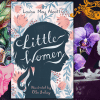When your fictitious version gets the happy ending

If you're someone who tends to pay attention to details, you will find a CliffsNotes for The Bell Jar on the coffee table next to Heather Chandler's dead body in the 1988 cult classic, Heathers. A decade later, we find the same book in Kat Stratford's hands in 10 Things I Hate About You, which is also the year that had the narrator in Fight Club annoyed at Martha for corrupting "the one real thing" in his life, as he furiously explained to her that, "in the Tibetan philosophy, Sylvia Plath sense of the word, I know we're all dying. But you're not dying the way Chloe is dying." And again, as the world ushered in a new millennium, we had Rory from Gilmore Girls following in on the tradition, when she showed up with her copy of The Bell Jar in the 17th episode of the show.
60 years since her death, Sylvia Plath is still astoundingly inescapable, deemed an icon—a feminist icon, a "femcel" icon, by Hollywood standards and teenagers on the interwebs alike. 60 years since the publication of her only novel and the name Sylvia Plath has become a buzzword in itself, something synonymous with a strange romanticisation of depression, the kind that impressionable young girls seem to believe is necessary in their pursuit of a personality that will accurately fit the role of an "intelligent, interesting girl".
The Bell Jar is famously described as the story of a young poet who wants to end her life, which she ultimately does. The book follows Esther Greenwood, one of 12 chosen girls travelling to New York City for a month as guest editors for a teenage fashion magazine. Esther arrives in New York with "fifteen years of straight A's" behind her and no idea about how much to tip the taxi driver or what drink to order at the bar.
The change from suburban New England to the crowded and lonesome New York is overwhelming to say the least, and not exactly in a good way, considering how the opening line of the book immediately startles you with the topic of execution: "It was a queer, sultry summer, the summer they electrocuted the Rosenbergs, and I didn't know what I was doing in New York." This really sets the tone of the novel as the plot progressively gets darker, with Esther grappling to disown her inability to experience the same joy that everyone around her seems to find so easily. She prefers to bury her head under the pillow so she can pretend it's still nighttime, because she did not see a point in getting up—she had nothing to look forward to. She feels "dreadfully inadequate" and depressed by her own silence, and then comes the heartbreaking realisation: "I thought how strange it had never occurred to me before that I was only purely happy until I was nine years old". There are repelling images of Esther lying in a pool of her own vomit; Esther bleeding out in the emergency room after her first sexual encounter and uncomfortable relatability shows up in the form of the famous "fig tree analogy", where Esther is confronted with the difficulty of having to choose one future or fig from an infinite number of figs, and ultimately starving herself from indecision in the process; or the one truly disturbing mention of Esther crawling between her bed's mattresses because she wanted so desperately to get the feeling of lying in a grave. Plath's approach to this book is accompanied by an earnest sense of intimacy and honesty when she describes Esther losing touch with herself, in the way she chooses to describe her heart beating after trying to drown herself in the ocean, "I took a deep breath and listened to the brag of my heart: I am I am I am", this deliberate use of the verb "brag", like her heart and her body is mocking her that she is still miserably alive.
Plath leaves enough room for the readers to immerse themselves into Esther, as the plot moves through recollections of old memories and anecdotes, through the past and present, reading like a letter you have received from a close friend. It is surprisingly easy to accept Esther's hopelessness as our own. I stumbled upon this book at a particularly depressing point in my life, when my infallible detachment from everything and everyone I cared about threatened to occupy a state of permanency. And when it felt too difficult to not be so terribly lonely in my impassivity, Esther and her drab commentary accompanied me with a welcome reassurance. Even as she continuously chose to be apathetic, allowing herself to be stifled and stuck in her glass bell jar, and reassurance sometimes gave away to annoyance–Esther still managed to retain her vulnerability because of how honest she was. She was full of contradictions and she was not afraid to show it. And perhaps that is because Plath has made her own share of trips to the psych ward, just like Esther, where she faced the irony of first describing the electric power just as a method of torture that killed the Rosenbergs, to having to accept the same electric power as medicine when it came in the form of therapy later on.
After Sylvia Plath's suicide, her hometown paper, 'The Townsman of Wellesley', actually reported her death as having passed away from a "virus pneumonia". In addition to that, there was a strange reluctance to address the book for what it was, no one wanted to associate it with the word 'suicide'. But that is in fact what happened, Sylvia Plath did indeed kill herself two months before The Bell Jar got published, two months before her fictitious version (Esther) decided to step into Dr Nolan's room in front of a board of specialists for her final psych assessment.It is hard to read The Bell Jar without any preconceived opinions pertaining to the autobiographical aspect of the book given how heavy handed it is with its associations to Sylvia Plath's personal life. Whether Esther succumbed to the same fate as Plath is a question that has varying answers, after all, all Esther had done was walk into Dr Nolan's room when the book reached its final page. But I am of the personal opinion that Esther did survive. Because the ending of The Bell Jar always reminds me of the famous Sylvia Plath quote that goes, "I can never read all the books I want; I can never be all the people I want and live all the lives I want. I can never train myself in all the skills I want. And why do I want? I want to live and feel all the shades, tones and variations of mental and physical experience possible in my life. And I am horribly limited," just like her use of the verb "brag" to describe her heart beating, the choice to describe a life as "horribly limited" at only 30 years of age sounds so incredibly sad. Even in her final hours Sylvia Plath was more concerned about blocking every crack in her children's bedroom door before she turned on the gas in the oven, and I like to think that in another universe she found it easier to reserve some of that kindness for her own self, because the fact that a novel written 60 years ago can still feel so timely is a real testament to the genius of her mind, and we could do with a lot more of that.
And this is why, in my heart of hearts, I truly believe Esther has had a different ending than Sylvia, because she deserves to live and feel every shade, tone and variation of life that Sylvia Plath was never able to.
Arshi Ibsan Radifah is a Literature major who loves unreliable narrators and Wes Anderson movie sets.

 For all latest news, follow The Daily Star's Google News channel.
For all latest news, follow The Daily Star's Google News channel. 








Comments